
Background information
Decadent but good – how sneaker cleaners give your shoes a makeover
by Laura Scholz

With a bucket and rag in the garden, in the shower or with a «Stützliwösch» (car washing gear) at the gas station: cleaning a bike has its pitfalls. A start-up from Zurich now wants to reinvent urban bike-washing. Their prototype facility is located at the Saalsporthalle.
The dirty Mondraker stands on the washing station behind Zurich’s Saalsporthalle, waiting to be freed from the remains of its last voyage. And even though the sun is blazing from a cloudless sky, the mountain bike looks like it’s been through a mud hole or two. This is the case, as Johannes Weiss tells me. He’d been riding his bike in the hills around Zurich that morning. Muddied due to all the April and May rain.
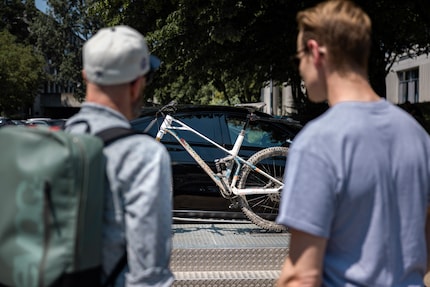
The prototype of this new bike wash has been in place at Zurich’s Giesshübelstrasse since the beginning of May. The co-founder of the Zurich start-up Station B is pursuing ambitious goals with a washing station for bicycles of all kinds. Further building permits and commitments for four additional sites have already been received from the landowners. A sixth application is pending. The next in-house stations will be in Zurich near Idaplatz and in Uster, then there’ll also be one in Brig, among other locations, starting July. These are the short-term plans of Johannes Weiss and his partners. In the long term, a network of washing stations is to be set up throughout Switzerland. On the one hand in the big cities, on the other hand in areas with a well-developed bike infrastructure.
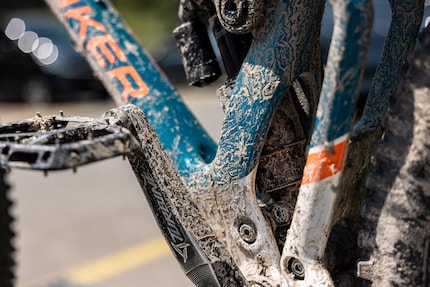
The stations in Baden are being built by apprentices from Libs. It seems mechanical engineers at this Swiss industrial apprenticeships group will have their work cut out for them in the coming weeks and months. According to Johannes Weiss, investments around 10,000 Swiss francs are required per system once it’s in series production. The prototype here at the Saalsporthalle is even more expensive. He doesn’t want to be more specific about how much. Empty, the thing weighs 300 kilogrammes, and two water tanks hold 100 litres each. In principle, the station requires only one power connection.

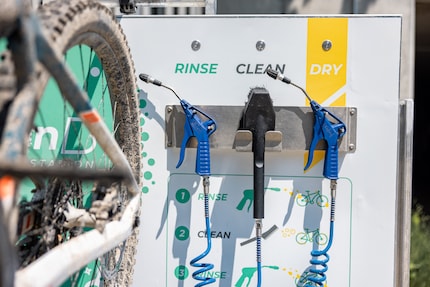
Cleaning takes place in four steps. The cyclist pre-cleans the bike with a water-air mixture. After that, stubborn dirt is removed with a brush. Following this, the water-air mixture is used again before the bike is finally dried with the air nozzle. The rest, such as applying corrosion protection or degreasing and oiling the chain, is done by the cyclist at home. Unless they’re already carrying the appropriate tools to do so.
In terms of cleaning agents, Station B is still in a test phase. The product currently used is biodegradable, dirty water is collected in the plant, pumped out and then disposed of in the appropriate recycling yards. The prototype consumes around two to 2.5 litres of water per bike. One minute of cleaning costs one franc.
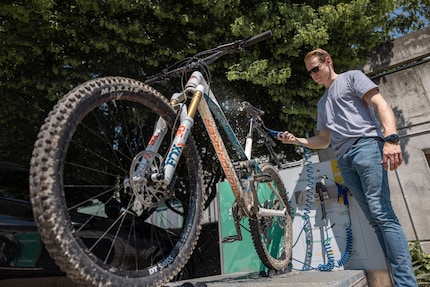
Depending on the degree of soiling, this sometimes takes a little longer, sometimes things go quicker. Johannes could have had his mountain bike clean again in about five minutes if he hadn’t been distracted by my questions during the process. He smiles when he says, «Mountain bikers may not place as much importance on a spotless bike as others, since it’s going to get dirty again on the next ride anyway.»
Founded in 2021, it took almost two years to get the prototype wash station operational, according to Johannes Weiss. Logistical issues, financing, building permits, negotiations with landowners and other hurdles had to be overcome. But why is such equipment needed at all?
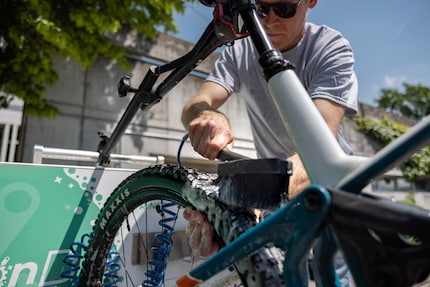
According to Weiss, for many recreational bikers, cleaning and caring for their bike is a challenge. The options for gently removing dirt from expensive sports equipment in a city are limited. The bucket and cloth method is cumbersome and takes too long, «Stützliwösch» equipment at the gas station with its high-pressure cleaner damages bearings and suspension elements more than the ride itself. And whether cleaning a muddy bike in the bathtub or shower makes sense, it remains questionable at least.
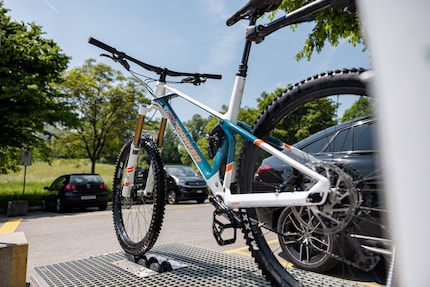
There’s also room for improvement in the prototype washing station. For example, the hoses for the nozzles and brush are a bit too short at two metres. The system is accessible from both sides, but the hoses aren’t long enough to reach. However, the problem has been identified and will soon be fixed with three metre hoses. Otherwise, everything works flawlessly as of now. I’d be happy to see the expansion of Station B’s bike wash facilities continue apace in my region.
By the way, you can find exact locations here:
Station B @ Saalsporthalle Zurich
Station B @ Zeughausareal Uster
Header image: Christian Walker
From radio journalist to product tester and storyteller, jogger to gravel bike novice and fitness enthusiast with barbells and dumbbells. I'm excited to see where the journey'll take me next.
Interesting facts about products, behind-the-scenes looks at manufacturers and deep-dives on interesting people.
Show all
Background information
by Laura Scholz

Background information
by Siri Schubert

Background information
by Martin Jungfer